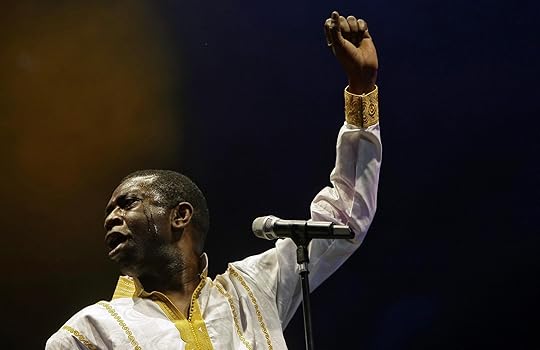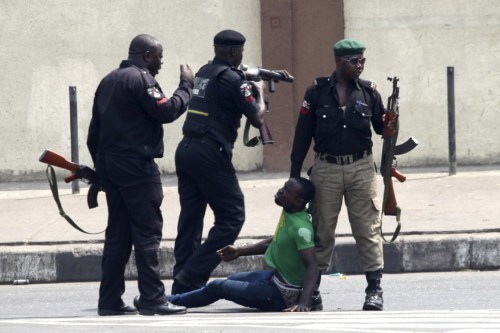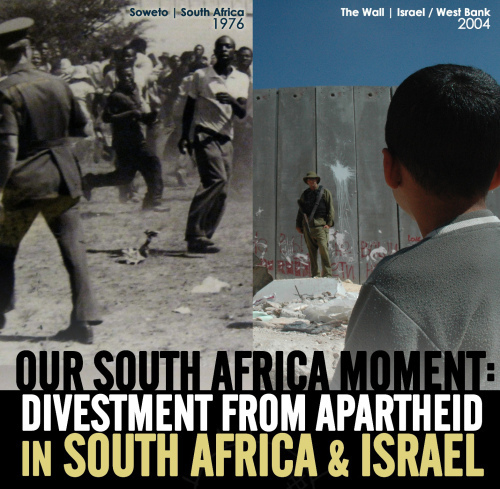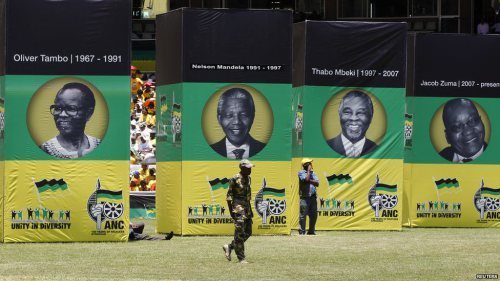Sean Jacobs's Blog, page 579
January 10, 2012
Is Youssou N'dour qualified to be President?

Al Jazeera English's "The Stream" have been focusing a lot on African news themes lately: first South Africa's ANC's 100th anniversary, then yesteryday they dedicated the half hour program to #OccupyNigeria. The producers invited journalist Omoyele Sowore of SaharaReporters, Afrobeat musician Sean Kuti (who have been prominent in marches), and Gbenga Sesan from the group Enough is Enough Nigeria. Lively discussion ensues. Nigerian and international media's role in the events also come under scrutiny. Later today (2.30pm Eastern Standard Time) they're continuing the focus on African themes when Senegalese singer Youssou N'dour's run for president in his home country gets an airing. Word is N'dour will be on the program. It will be interesting to see how they tackle N'dour's candidacy, reported in breathless tones in Western media thus far.
The truth is, most serious analysts don't give N'dour a chance and in some quarters his candidacy is viewed as a publicity stunt — among other factors, N'dour, who has a large fan audience outside Senegal, has no electoral organization in place; enters a a crowded opposition field; while the incumbent (Abdoulaye Wade) is an experienced campaigner and controls the electoral machinery. As historian Mamadou Diouf told The New York Times: "Because of his success, he is the most popular artist in the whole history of Senegal. But it's going to be hard for him to advance even to the runoff because he doesn't have political experience or an organization." N'dour will also have to shake the perception that he is an opportunist (until recently he was an ally of Wade and some critics associated his business success–he owns a range of broadcast and print media in the country–to that association) and that he is just a pop star. Btw, in one of the strangest pieces I have read recently in the Financial Times, Robert Novak's son in law Christopher Caldwell in his regular column went after N'dour for this reason, tarring N'dour with the privileged outsider tag and basically endorsed Wade. One other decisive factor is N'dour's shaky relationship to traditional Sufi religious authorities who have some sway in electoral politics. (Wade is very deferential to them.) In the past N'dour has riled them. In the most famous case, in 2004 N'dour recorded an album, "Egypt," of Sufi Islamic praise music with the Egyptian national orchestra. The album won him a Grammy (it's beautiful music; I play it in the car sometimes on occasional trips out of state), but it was controversial in Senegal. N'dour sought to counter negative perceptions of Islam in the West in the wake of 9/11. Sufi adherents did not feel their very relaxed brand of Islam had anything to do with fundamentalist versions of the religion. (The album controversy forms the heart of the 2008 documentary "I Bring What I Love" — including objections by some Senegalese that the filmmakers not film holy sites and religious rituals.) For a while, record stores were discouraged from selling it and radio DJs from playing it. I wonder if N'dour has lived that down. More recently, N'dour has flirted with the extraparliamentary opposition to Wade led by a new generation of Senegalese music stars, mostly rappers who have taken his place in popular culture at home who don't necessarily see him as a political leader. In 2009, for example, N'dour recorded a song to condemn the government's handling of the electricity crisis, but he is not considered a central part of the rappers' struggle. (Some of them are the focus of the 2008 documentary "Democracy in Dakar"; the other is the rapper Awadi.)
The program should make for interesting viewing.

January 9, 2012
Music Break. Woklow
Malinese rapper Amkoullel gets some help from Pap G and Young Keitch in his "battle between good and evil." The track itself is so-so, but it did remind us we should soon write a post about the increasing use of sci-fi and horror elements in (fairly) recent music videos and films — which would include Matthew Jankes's Umkhungo, Niyi Akinmolayan's Kajola and Jean-Pierre Bekolo's Les Saignants, amongst others.

Occupy Nigeria

Nigeria's political leaders probably did not expect this kind of response from the populace –mass protests, a national strike starting today that shut down major cities–when they decided, on January 1, 2012, to scrap fuel subsidies (as part of "reforms" to deregulate the oil sector). The rationale was that by freeing money spent on the subsidy they could spend it on infrastructural improvements. The problem is Nigerians people don't trust the government or overpaid public representatives with taxpayers' money. That the price of fuel doubled overnight increasing transportation and energy costs and food prizes. For a week now police have faced down mostly peaceful protests culminating with a national strike organized by the country's major trade unions, the Nigeria Labour Congress (NLC) and the Trade Union of Nigeria (TUC). Not even brief, though fatal, attacks by terrorist group Boko Haram (targeting Christians) could derail the protesters. (In some instances Christian protesters protected praying Muslims.) And in what is now a standard for political struggles on the continent, the Nigerian diaspora protested in a Western capital, this time in London. (The link provides video evidence; see also here.) Nigerian entertainers have also been forced to take a stance; like Dbanj, Don Jazzy and Banky W. Seun Kuti (he was on Al Jazeera today discussing the fuel subsidy crisis) and Dede Mabiakwu (who played in Fela's band) joined marches. Producer Don Jazzy also came out in support of the protests. Even Chinua Achebe condemned the government. When popular Nollywood actress Genevieve Nnaji declared her support for the cuts, her fans tweeted their displeasure. The protests are probably the largest in any Sub-Saharan African country in a long while.
The real focus of the anger is Nigeria's political class, especially President Goodluck Jonathan (known as "bad luck" to protesters) and finance minister Ngozi Okonjo-Iweala (she can't hide her irritation with protesters). Okonjo-Iweala was lampooned by bloggers and on twitter. Protesters scoff at Jonathan's responses — cutting ministers' travel and salaries, introducing 1000 diesel buses. So has been the popular response to the Congress's motion to ask Jonathan and his cabinet to reverse their decision on the fuel subsidy and calling for wider consultations around the reforms. Instead the national strike went ahead.
I've been disappointed by the intermittent coverage in Western media, mostly focusing on violence associated with protests or rationalizing the subsidy cuts. (Some media only covered Boko Haram's violence last week.) "Expert" opinion in the West supported Jonathan and Okonjo-Iweala. Jeffrey Sachs, special representative to the UN on an official visit to Abuja, congratulated Jonathan on the decision. Not surprising since we know Sachs's record on deregulation. By Sunday, however, the UN — probably aware of the record of Sachs's recommendations — distanced itself from his remarks.
The Harvard MIT internet analyst Ethan Zuckerman, who has been writing on social media and protest, blogged on Friday that Occupy Nigeria was "a reactionary Occupy Movement," dismissed their analysis of the situation as "oddly partisan" and had high praise for finance minister Okonjo-Iweala (he called her "internationally celebrated"). Zuckerman ended by writing: "Occupy Nigeria is a conservative movement fighting to keep a dysfunctional status quo in place, which seems at odds with other branches of the movement." Nigerians were quick to challenge Zuckerman on his blog and on twitter — some ad hominem (sample comment: "you are obviously very clueless about Nigeria or Nigerians"), but others had more valid criticisms — his silence on the role of Western oil firms in the oil sector, misrepresentation of Occupy Nigeria, his support for deregulation, and his strange dismissal of the protesters as rightwing and reactionary. (Alex Thurston of Sahel Blog has a good takedown of Zuckerman's positions here.) By Sunday, Zuckerman, stung by the criticism, backtracked on some of his views. A case of his own medicine.
I am hoping the coverage gets better. Al Jazeera English, while they have a correspondent there and made it their lead all day, have not shown the same round the clock dedication to live covering the protests as they have done in North Africa, though it has wide appeal. (To their credit, Al Jazeera's "The Stream," focused on Nigeria earlier today; guests included Seun Kuti.) Meanwhile, Nigerian sites in the diaspora like Sahara Reporters have presented comprehensive coverage. And Jeremy Weate of Naijablog has a great take on why now and speculates on how this will end:
… Nigerians have never been so united in years – last week, in the unofficially renamed Liberation Square in Kano, Christians guarded the space as their Muslim co-protestors prayed. In return, last Sunday, Muslims guarded Churches as others prayed inside.
What we are witnessing with Occupy Nigeria is a generational transfer, as young, social-media enabled activists gradually take over the baton from unionist stalwarts. Nigeria's young population is increasingly letting go of the deferential attitude of their parents generation. In the south at least, young Nigerians are beginning to ask questions of the religious leadership that has been complicit with the status-quo. At long last, there is accountability pressure building up in the system.
In the short term, following on from the next few days of protest and shut-down, it's hard to imagine anything other than a policy reversal, and a planned withdrawal being announced, in step with a clear programme of projects that must be delivered before any further withdrawal of subsidy is implemented … Even at this very late stage, President Goodluck could become a hero of the process. Come what may, underlying events this week a deeper shift is at work: a new generation of Nigerians well versed in events to the north in Tunisia, Egypt and Libya is demanding that the terms of the social contract in Nigeria are re-written, in favour of increased accountability in political leadership.

Slavery and ice cream at the Waterfront
Not today's music break. No matter how big your star or fan-base is in Zimbabwe, Gabon or francophone Europe, if you intend to rap about slavery while eating an ice cream at Cape Town's Waterfront, you're making a fool of yourself. Or is there a reference to Signal Hill being a historic slave cemetery we missed?

Not Today's Music Break
No matter how big your star or fan-base is in Zimbabwe, Gabon or francophone Europe, if you intend to rap about slavery while eating an ice cream in Cape Town's Waterfront, you're making a fool of yourself. Or is there a reference to Signal Hill being a historic slave cemetery we missed?

Fly-by-night Journalism
In one of the oddest welcomes to the new year, Eurasia Group included South Africa as one of ten on a list of "Top Risks for 2012." Other entries include North Korea, Pakistan and Venezuela. Al Jazeera English program "Counting the Cost" then reported the list, renaming risk no.9 as "South Africa (ANC)." (See the 7.50 mark in the linked Youtube video.) The same kind of hysterical sentiment (because it is not analysis) informs media coverage of the ANC's one hundredth anniversary celebrations this past weekend. From the media you'd get the impression that the party's celebrations were being held to an empty stadium (with only Jacob Zuma and Julius Malema present) and that the ANC's support (largely grassroots) had deserted it. Instead we know, as the New York Times had to point out, that "tens of thousands" filled a stadium in the Free State provincial capital Manguang. Elsewhere we learn that millions watched it live on TV. A quick scan of the hashtag #ANC100 on Twitter suggest most people who watched or talked about the celebrations got the significance of the date and the achievement as well as the ANC's continued pull in South Africa. So did people's status updates on Facebook. They know the ANC is not just Malema and Zuma.
Anyway, as Jonathan Faull has blogged here before, reporting on South Africa basically amounts to parachute journalism. And as Melissa Levin, a former ANC official now living and studying in Toronto, tells us below, even media outlets that should know better, can't help themselves—Sean Jacobs
Melissa Levin, Guest Blogger
At best they express an acute deficiency in generosity. A little worse is the ignorant display of ahistory. But the most irritating for me of specially the (UK) Guardian's pre-ANC centenary commentary is the inability to reposition their lens from caricatures of African political life.
As usual, according to this narrative reflex, African politics is bound to disappoint. The coverage of the centenary celebrations defaults to the tired clichés of African liberation movements' consistent decline into authoritarianism. It's not only a lazy and boring analytical frame, but it's damaging to posterity too.
In one article, the usually incisive Alistair Sparks is quoted bemoaning the "airbrushing out of history" — that fashionably over-used critique of communist totalitarianism popularized by Milan Kundera — of important liberation or opposition figures to Apartheid who were independent of the ANC. In particular, Sparks laments the fact that there are no streets named after Desmond Tutu or Helen Suzman, but plenty after ANC stalwarts.
But the thing is, to take the case of Tutu first, the national policy framework for naming of places and streets, which trickles down into municipal naming practices suggests that the living should not be memorialized. No-one would be breaking the law naming a park after a living person, but the principle attempts to encourage a thoughtful transformation of the memorial landscape of the country and an anti-authoritarian one at that.
In many respects, the ANC has extracted much of the political content out of its post-Apartheid memorial practices and has bureaucratized the processes of memorializing the past in much the same way that neo-liberal states trade politics for technocratic procedure or rather, trade on a politics of technocracy. The Johannesburg Municipality had in fact wanted to rename an important thoroughfare in Houghton, the suburb where Nelson Mandela has a home and was the long-standing constituency of Helen Suzman. It was proposed that the street be named "Helen Suzman Drive" (when Suzman was still with us). But she objected. Perhaps on the basis of principle. Perhaps in the knowledge that her name could come to mean something other than what it means today on the basis of its association with a street (such as potholes or road accidents). But whatever her logic, the sentiment to honour her through a street name was there. (Suzman passed away in 2009.)
The one living person who has official and substantial recognition throughout the country is Nelson Mandela. As he does in the international milieu, at home Mandela seems to stand above politics, much to his own consternation, and remains the one figure around which all political persuasions can rally. Indeed, there have been numerous discursive battles in the last number of years over which political entity is continuous with his legacy. The parliamentary opposition Democratic Alliance often claims that the ANC today is anathema to the generation of Mandela and, instead, it occupies the position of principled leadership that rhymes with the ANC's 'golden age'. If we were to talk about airbrushing history, this would have to be it.
The ANC's hegemonic ambitions have not, for the past 18 years of democracy at least, been transfixed with the molding of public memory around anything more substantial than the nebulous notion of promoting 'social cohesion'. If anything, the ANC pays too little attention to history. In some ways, it is because it takes history for granted and takes to heart the revolutionary's logic that "history is on our side". But we know too that history's battles are not just material — they play out on the field of discourse and narratives. It is in this sphere where the ANC has dropped the proverbial ball. Not only has the commemorative domain been largely privatized in South Africa, but the ANC has left much of the artillery of colonial memorialization intact.
The ANC-led municipality in the country's capital city has been attempting to change the city's name and its streets since 2000 and has been met with virulent protest that has paralyzed its endeavor. The technocratic proceduralism that informs the transformative agenda has locked the municipality in court battle after court battle designed to retain the status quo. The new country's capital city has thus far kept the name, Pretoria, a memorial to the Boer general and colonizer, Andries Pretorius. And it's not that the name change itself was offering a revolutionary break. The municipality within which the capital city is located has been named, Tshwane. Tshwane was a pre-colonial traditional leader who is remembered in oral narratives of local residents, but whose existence is called into question by archival historians. Nevermind the historical debates, the elevation and vivification of Tshwane hardly articulates a ruling party bent on populating the landscape with its dead heroes. The only new 'political' street-name in the capital city is Nelson Mandela Drive (or Nelson Mandela Rylaan in Afrikaans). Although largely embraced by all, some mischievous right-wingers recently spray-painted out the 'Nelson Man' on street-signs leaving 'delarylaan' (translated as Delarey Avenue) alluding to a heroic figure in Afrikaner nationalist historiography.
This statement that the ANC's attention to history has been anemic at best, should not be confused as a call for nationalist authoring of a universalist narrative. But it is a call for not forgetting the relationship between capitalism and apartheid. It is an appeal to remember how they have colluded to produce a society that remains doggedly inequitable, an inequity that is racialized and gendered, in the absence of which these injustices continue to be naturalized, with black and female impoverishment but the sad face of nature's state.
Besides for 'airbrushing' people out of history, another peculiar Guardian story is headlined thus: "ANC celebrates its centenary trading on past glories". It is rather an odd headline since it suggests that this is somehow not the obvious thing for a 100 year old entity to do–celebrate its past 100 years. It is also suggestive of a cynical organization that is no longer glorious and can only trade on its past to retain its legitimacy. That may be so, but left under-analyzed it assumes its own nostalgic prism of a past once unsullied subjugated to the political needs of a corrupted present. But let's try and give credit where credit is due: this ANC is no fly-by-night entity. It has withstood the test of time. It has stood principled in the face of deep repression while pragmatically altering its course to respond to increasing suppression. It formed a broad-based opposition that ultimately overthrew a seemingly intractable militarized racist state. It built its opposition on multiple pillars of struggle that did not rely on militarization alone. It is an organization that has overwhelming electoral support and has ensured that no president has overstayed his constitutional welcome (there have been four in almost 18 years of ANC rule). No doubt the ANC historically and contemporaneously has numerous and deep weaknesses and fault-lines, and we should not lose sight of those. But on its 100th anniversary, let's find it in ourselves to salute this institution of anti-colonial liberation. It has been the ANC, after all, that over 100 years, has nurtured a unity in the once assumed unimaginable community that is contemporary South Africa.

Oh Amadou
I think it was 2005 when I first saw Amadou & Mariam play live. At the local summer festival in Brussels, the tent was pretty much empty when they walked on stage. An hour later, toward the end of their set, it was packed with people having to squeeze hard to find themselves a decent spot. At the time, a friend who was familiar with their early work (I wasn't) said he didn't like what Manu Chao, the producer of their international break-through album Dimanche à Bamako, had done with their sound. I, on the other hand, remember it playing all year long afterwards. Remind me to ask him again what he makes of their new album, Folila, which comes out in March and has contributions by Bertrand Cantat on "Oh Amadou", Nick Zinner and Santigold on "Dougou Badia" (both songs are on the EP that was released today), Theophilus London, TV On The Radio, Idrissa Soumaoro and Bassekou Kouyate.

January 6, 2012
Anbuley 'pushing African music into the future'
Anbuley is one of those names that I always check for when seeking out new music. This Austria based Ghanian singer's willingness to jump on unconventional beats has her appearing on such underground club hits like Zakee's Sane Eba, and Bert on Beats' Suomo. This kind of experimenting in the diaspora, while still rooting one's self back home (especially by singing in Twi) is at its best when it allows or encourages our brothers and sisters to take risks with their music tastes and production choices. In the face of sometimes stagnating local music scenes, I can't help but think it's the kind of thing that will continue to push African music into the future. I assumed as much when a friend of mine threw Sane Eba on in an Accra Taxi, and the driver started murmuring along.

A Conversation on Apartheid

Keeping with our South Africa thread.
For our readers in Southern California, a very important conversation will be taking place at the University of Southern California on Thursday, 12 January. Omar Barghouti, one of the organizers of the Palestinian Campaign for the Academic and Cultural Boycott of Israel, will join legendary U.S.-based scholar-activists Angela Davis and Fred Moten to discuss the correlations between the divestment campaign against South Africa's apartheid regime and the ongoing Boycott, Divestment and Sanctions (BDS) movement against Israel.
Given the long history of South African and Palestinian collaboration against apartheid and occupation (in part inspired by the history of both nations aiding each other's oppressive regimes), I am looking forward to reporting back on this event for AIAC. But for those able to attend, I look forward to ringing in the new year with an anti-apartheid allied strategy session.








Shameless Self-Promotion: Sean (on Al Jazeera) talks about Africa's oldest liberation movement turning 100
This week 100 years ago, South Africa's current ruling party, the African National Congress or ANC was born. It would go on to dominate resistance politics against Apartheid. Many assume today's ANC is very different from that of its founders or its high points in the 1950s and later through the 1980s and 1990s. "Does South Africa's ruling ANC still fight for the same values it championed 100 years ago?" was the theme for Al Jazeera English program, "The Stream" yesterday. The producers invited me help answer this and other questions about the ANC so I traveled down to Washington D.C. The show is presented by Derek Ashong. (Remember him?) He was joined by guest host Latoya Patterson (she's also a blogger at Racialicious). The show is live, fast paced and incorporates social media. Unfortunately technical difficulties meant it was hard to hear the inputs of the other 2 guests–Keith Khoza, ANC spokesperson, and journalist and commentator Karima Brown– linked to the studio via Skype. The video, above, of the show also includes a 10-minute post-show which was streamed online after the TV channel returned to its regular programming. It's riveting stuff.
Thanks to producer Melissa Giaimo for inviting me.
Oh, and my wife takes credit for suggesting I wear the nice pink shirt.
* With that we're open for blogging in 2012.








Sean Jacobs's Blog
- Sean Jacobs's profile
- 4 followers







